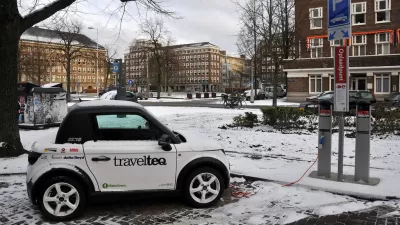It may seem odd that the continent of high gas taxes and strong environmental ethos would not take to electric vehicles. Focusing on the news that Renault will delay the release of a new EV, AutoblogGreen explores the poor sales of EVs in Europe.

With the notable exception of Norway and perhaps premium models (see below), Europe has not particularly welcomed the new electric vehicles (EVs), much to the chagrin of Renault-Nissan chief Carlos Ghosn who cites lack of demand for delaying the introduction of a new Renault EV, the Twingo ZE.
"The problem is that people aren't clamoring for the Twingo, leaving the order books fairly empty. The company now says it will delay the model's debut to an undetermined future date, Bloomberg News says...," writes Autoblog's Danny King.
What's odd is how EVs from the two companies in the "alliance" can fare so differently. Nissan Leaf is far way the best selling EV in the U.S. and globally, having sold 50,000 and 115,000 respectively. For a comparison with sales of other plug-in models, including plug-in hybrid electric vehicles (PHEV), see chart of 2014 EV sales in U.S. from Inside EVs.
On the other hand, Renault sold less than 20,000 its EVs, which includes three models, adds King. However, Renault is not marketed in the U.S.
In Norway, due to its generous incentives, the Tesla Model S is the best-selling car; Nissan Leaf number three.
at Bloomberg News offered this perspective from "Sascha Gommel, a Frankfurt-based analyst at Commerzbank AG who has a hold recommendation on Renault stock":
“Most people who buy electric vehicles tend to be premium buyers, as zero-emission cars are more expensive,” he said by phone. “They’d rather go to premium brands like Tesla or BMW, as opposed to a maker of conventional mass-market cars like Renault, which needs to justify the premium on its electric vehicles.”
FULL STORY: Renault delaying electric Twingo because no one wants one

Manufactured Crisis: Losing the Nation’s Largest Source of Unsubsidized Affordable Housing
Manufactured housing communities have long been an affordable housing option for millions of people living in the U.S., but that affordability is disappearing rapidly. How did we get here?

Americans May Be Stuck — But Why?
Americans are moving a lot less than they once did, and that is a problem. While Yoni Applebaum, in his highly-publicized article Stuck, gets the reasons badly wrong, it's still important to ask: why are we moving so much less than before?

Research Shows More Roads = More Driving
A national study shows, once again, that increasing road supply induces additional vehicle travel, particularly over the long run.

Judge Halts Enforcement of Anti-Homeless Laws in Grants Pass
The Oregon city will be barred from enforcing two ordinances that prosecute unhoused residents until it increases capacity and accessibility at designated camping sites.

Advancing Sustainability in Los Angeles County Schools
The Los Angeles County Office of Education’s Green Schools Symposium brings together educators, students, and experts to advance sustainability in schools through innovative design, climate resilience strategies, and collaborative learning.

Using Old Oil and Gas Wells for Green Energy Storage
Penn State researchers have found that repurposing abandoned oil and gas wells for geothermal-assisted compressed-air energy storage can boost efficiency, reduce environmental risks, and support clean energy and job transitions.
Urban Design for Planners 1: Software Tools
This six-course series explores essential urban design concepts using open source software and equips planners with the tools they need to participate fully in the urban design process.
Planning for Universal Design
Learn the tools for implementing Universal Design in planning regulations.
City of Moreno Valley
Institute for Housing and Urban Development Studies (IHS)
City of Grandview
Harvard GSD Executive Education
NYU Wagner Graduate School of Public Service
City of Cambridge, Maryland
Newport County Development Council: Connect Greater Newport



























